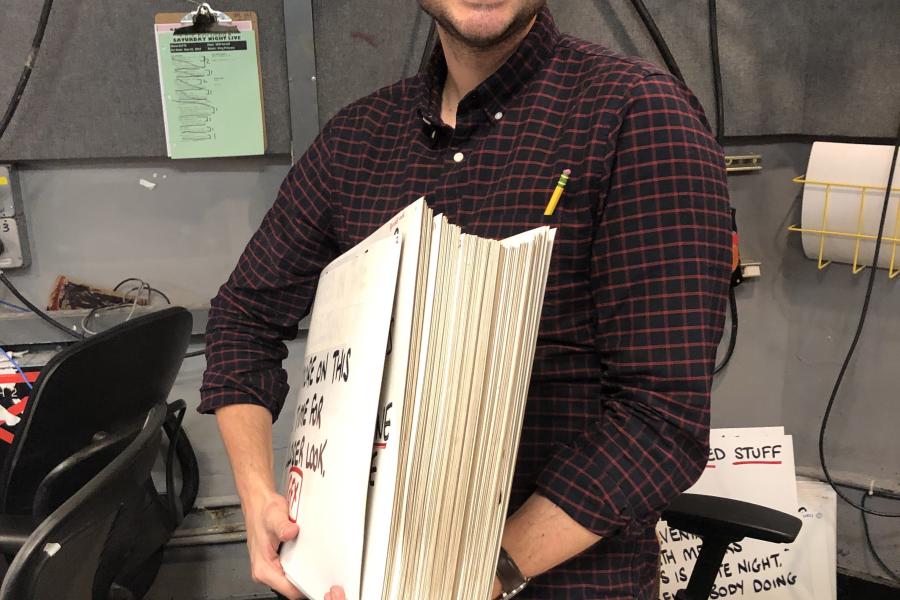If you want to walk a mile in Sal Gentile's shoes, you had better get a comfortable pair.
These days Gentile, A&S '08, an Emmy-nominated writer for NBC's Late Night with Seth Meyers, has been pounding the pavement in New York City as a striking member of the Writers Guild of America.
Since May 2, over 11,000 union members walked off the job and into picket lines from Los Angeles to New York City after contract negotiations with TV and film studios in the Alliance of Motion Picture and Television Producers stalled. The Hollywood actors' union, SAG-AFTRA, joined the strike July 14.
Writers have yet to be called back to the bargaining table over requests such as higher wages and limiting the use of artificial intelligence—using computers for human tasks—in the creative writing process.
Once the writers' strike hit, late night shows such as Gentile's gig were the first to go dark. The forced break was an adjustment for Gentile, who earned his bachelor's degree in Writing Seminars. As an architect of the show's signature segment "A Closer Look," a joke-packed journey through the day's latest political controversy, Gentile is used to having a regular outlet for his 24-hour news consumption. After two months of striking, Gentile talked to the Hub about why he traded in his pen for a picket sign.
This isn't the guild's first strike. What are writers fighting for this time?
Broadly speaking, we're fighting to ensure that this remains a sustainable career for everybody and not just the privileged few. Everybody in this industry should have basic job guarantees for a livable career with minimum guarantees of pay and health care. People may not realize this but when you're a writer, you're going from gig to gig and you are sustained by residuals. If you write on something successful, you get paid based on the reuse of your material. You hear about these shows that are massive successes on streaming. If they got the same number of views on traditional media, [like] broadcast, the creators would have been paid for the success of the show they made. But if they have the same success on streaming, they see none of that because they're not getting payment. [Studios are] trying to take away the minimum basic guarantees and profit sharing that made this a livable, sustainable career.
What is the future of your industry if the WGA doesn't stand firm?
If we don't stand up for a reasonable deal, the future is going to be what a lot of other venture capitalist tech companies have done to other fields. They want to turn as many jobs into gig jobs where you don't get health care or pension—especially the model we fought for, the profit sharing model where people have a livable career. All of that will go away.
You're more than halfway through the length of the 2007-08 strike. What is the vibe like on the picket line nowadays?
The vibe has been great. There's been a huge turnout even in the hottest days of summer. There's a camaraderie to seeing people you don't often get to see. And there's fun events. Themed pickets and rallies. It's nice. People bring food. And the best thing about New York? Lots of honking trucks. I never thought I could love a honking truck more than my 3-year-old son.
The 24-hour news cycle doesn't stop for a strike. Without "A Closer Look" to write, how have you been coping?
I'm just a few days away from walking through the park with a long beard, grizzled gray hair, rambling about the news, throwing bread to the ducks and telling them the latest thing Trump got indicted for. The way that I'm coping is the solidarity. It's very galvanizing to be with your friends and colleagues on the picket line and to know what we're fighting for is a good thing for our fellow creative professionals.
What's the best picket sign you've seen?
"Don't make me spoil 'Succession.'" I like silly threats.
Editor's note: Natalie McGill is a member of the Writer's Guild of America.
Posted in Arts+Culture, Voices+Opinion, Alumni
Tagged alumni, writing seminars








